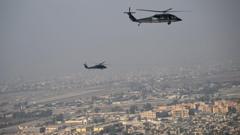The U.S. government has begun the evacuation of non-essential personnel and their families from the U.S. Embassy in Baghdad due to growing security threats linked to deteriorating talks surrounding Iran's nuclear activities.
US Orders Partial Evacuation of Embassy Staff in Iraq Amid Security Concerns

US Orders Partial Evacuation of Embassy Staff in Iraq Amid Security Concerns
The decision comes as tensions rise over stalled negotiations regarding Iran's nuclear program.
Non-essential staff and their dependants from the U.S. Embassy in Baghdad are being evacuated as a precautionary measure, according to sources from the U.S. government. Although officials have not disclosed the specific reasons behind the evacuation, the move follows a series of unsettling developments regarding Iran’s nuclear program, which have recently stalled. A State Department representative confirmed to the BBC that they continuously review the personnel situation at their embassies and decided to reduce staff in Iraq after their latest assessments.
President Donald Trump voiced his concerns on a podcast, indicating a diminishing confidence in the possibility of reaching a conclusive deal on Iran's nuclear ambitions. The primary goal of the U.S. is to persuade Iran to halt uranium enrichment—a process that can potentially lead to the development of nuclear weapons—in exchange for a relaxation of economic sanctions.
Moreover, Iranian Defence Minister Aziz Nasirzadeh issued a stern warning that Iran would respond decisively against U.S. military bases in the Middle East should negotiations fail and authorized military actions be taken against Iran. This echoes sentiments recently expressed by U.S. Defence Secretary Pete Hegseth, who, in Congressional testimony, noted indications of Iran's movement toward capabilities resembling those needed for a nuclear weapon.
On the same day, the UK's Maritime Trade Operations agency—part of the Royal Navy—issued alerts regarding heightened military tensions in the Middle East, cautioning that this could adversely influence shipping routes. Following news of the U.S. embassy evacuation, oil prices surged by over 4% as traders reacted to potential disruptions in supply due to the escalating regional instability. Currently, approximately 2,500 U.S. troops remain stationed in Iraq, as highlighted by the Department of Defence. Further coverage and analysis on this unfolding situation will follow.
President Donald Trump voiced his concerns on a podcast, indicating a diminishing confidence in the possibility of reaching a conclusive deal on Iran's nuclear ambitions. The primary goal of the U.S. is to persuade Iran to halt uranium enrichment—a process that can potentially lead to the development of nuclear weapons—in exchange for a relaxation of economic sanctions.
Moreover, Iranian Defence Minister Aziz Nasirzadeh issued a stern warning that Iran would respond decisively against U.S. military bases in the Middle East should negotiations fail and authorized military actions be taken against Iran. This echoes sentiments recently expressed by U.S. Defence Secretary Pete Hegseth, who, in Congressional testimony, noted indications of Iran's movement toward capabilities resembling those needed for a nuclear weapon.
On the same day, the UK's Maritime Trade Operations agency—part of the Royal Navy—issued alerts regarding heightened military tensions in the Middle East, cautioning that this could adversely influence shipping routes. Following news of the U.S. embassy evacuation, oil prices surged by over 4% as traders reacted to potential disruptions in supply due to the escalating regional instability. Currently, approximately 2,500 U.S. troops remain stationed in Iraq, as highlighted by the Department of Defence. Further coverage and analysis on this unfolding situation will follow.



















